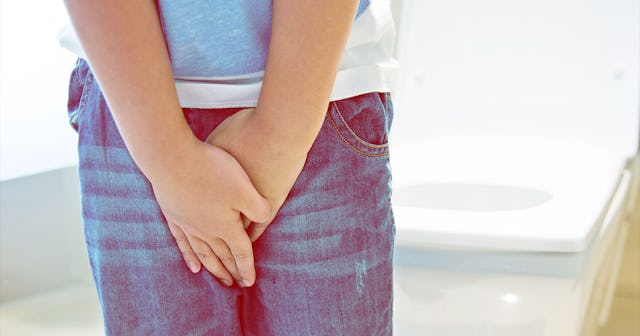What You Need To Know About Testicular Torsion

I was busy scrolling on my phone, telling myself I was minding my own business, and ignoring responsibilities when I saw a “FYI” post pop up in a local parents’ Facebook group. These types of posts are usually not informational, just thinly veiled complaints or frustrations being passed off as helpful advice, but they’re usually still worth the entertainment value to stop and read. Other times, the FYI posts include tips on local sales, a missing pet, or (when we weren’t all worrying that every sniffle is COVID-19) the latest virus making its way through school. As often as parents ask other parents to diagnosis their children’s ailments and rashes, they like to announce their children’s sick conditions too.
I’m not quoting here, but the gist of the post that stopped me was: FYI: If your kid complains that his testicle hurts, take him to the doctor right away. My son had to have emergency surgery because of testicular torsion. She then said his testicle could have died had they waited much longer.
Excuse me. What?
As if I don’t have enough to concern myself with, I have to worry about my child’s testicle dying too? Once again the books offering baby care and parenting advice did not cover “What To Do When Your Kid’s Genitals Twist On Themselves.” But that’s what testicular torsion is. According to The Mayo Clinic, it happens when a testicle rotates and twists the spermatic cord it’s hanging from. This blocks blood from flowing freely to the scrotum and causes intense pain and possible swelling in the crotch.
Serghei Turcanu/Getty
About 1 in 4,000 people with testicles experience testicular torsion, according to the American Urological Association, and some of these people are born without tissue that holds the testes to the scrotum. This fun term is called “bell clapper deformity” because the testes can just swing around like, well, a bell clapper. It’s going to be hard to get this image out of my head. Testicular torsion happens most often when kids are between the ages of 12 and 18 and it’s a condition that can run in the family. Congrats, kid! You got your sperm donor’s affinity for genital gymnastics!
As the Mayo Clinic explains, testicular torsion can happen hours after vigorous activity, while sleeping, or while just chilling on the couch until there is suddenly nothing chill about anything. Cold temperatures or rapid testicle growth during puberty can cause testicular torsion too. Jesus Christ, can balls just not be dicks for once?
Other symptoms of testicular torsion—I think twisty testes is a better name and sounds less like a car engine problem, but I’m not a doctor—are nausea, vomiting, abdominal pain, frequent peeing, or a testicle that is sitting higher than the other or situated at an odd angle. As someone who once had breasts, I get the whole sitting at weird angles thing so I don’t have a ton of sympathy in general for testicles; however I don’t want my kid to lose any reproductive ability because I ignored asymmetry. For the record, I’m fine with some people never producing offspring, but that’s not for me to decide either.
If immediate care isn’t given to sudden or intense pain in the scrotum, then a testicle could be damaged or die and have to be removed. Sometimes the pain can occur and then go away on its own when the testicle twists and then untwists itself. But in both cases, surgery is necessary to fix the problem or to prevent it from happening again. The amount of testicular twisting can be from 180-720 degrees; more twists means the quicker the damage can occur. If emergency surgery happens within 4-6 hours of the twisting, 90% of the time the testicle can be saved. However, that rate drops to 50% after 12 hours and 10% after 24 hours.
During the surgery a doctor will cut the scrotum, untwist the testicle, and then stitch it to the inside of the scrotum to keep it from twisting again in the future. Apparently this is less painful than the actual torsion. Recovery is relatively easy and after a few weeks of restricted activity, including masturbation and sex, normal activities can be resumed but the patient should always check with their doctor. While this is a serious situation, it’s not like the scrotum is giving birth or dealing with menstruation every month. We should stop saying it “takes balls” to do something daring when balls can’t even take a few spins on the spermatic cord it’s connected to without putting itself at serious risk. Vaginas are by far the stronger genitalia and need to be given more respect, but I digress.
If your favorite pain in the ass is having pain in their scrotum, get it checked out ASAP.
This article was originally published on